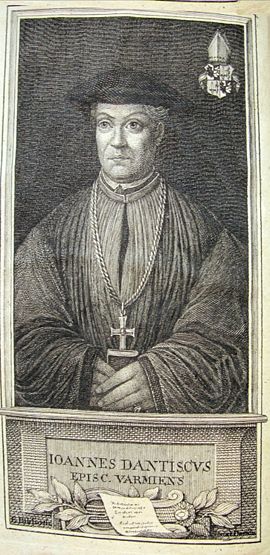Prominent Poles
Joannes Dantiscus, (German: Johann(es) von Hoefen or Johann(es) Flachsbinder; Polish: Jan Dantyszek), poet, prince-bishop of Warmia, politician

Born: October 1 (or September 30), 1485, in Gdansk, Poland
Died: Died: October 27 (or 28),1548, in Lidzbark , Poland
Early days. His father was a brewer and merchant in Gdansk. His family's name was von Höfen, while Flachsbinder was an occupational name derived from his grandfather's ropemaking trade (literally flax binder). Johannes took on the nickname Dantiscus in order to show that he was a burgher of Gdansk/Danzig (Latin: Dantiscum) He finished his elementary studies at a parish school in Grudziadz, and studied first in the second oldest university in Germany in the Hanseatic city of Greifswald, then in Cracow where he was awarded a bachelor's degree. During his studies, the teenage Dantiscus became associated with the royal court of King Jan I Olbracht (John I Albert) of Poland, and took part in military expeditions against the Turks and the Moldavians. He also traveled to Greece, Italy, Palestine and Arabia.
Career. For over 30 years he was a royal diplomat and the royal secretary. Dantiscus, at King Sigismund I's (Zygmunt I Stary) of Poland side, took part in the Holy Roman Empire's convention of Vienna in 1515. The same year he got hi Dr.jur. degree. In 1516 in Vienna he was knighted by the emperor Maximilian for his services and was made a nobleman. Johannes became in 1529 a church canon in Warmia, then in 1530 Bishop of Chelmno and in 1537 a Bishop of Warmia. He also wrote many poems, mainly in Latin, for which he is regarded as one of the most outstanding poets. Among his many works is his autobiography Vita Joannis de Curiis Dantisci ("The Life of Johannes of the Gdansk Church").In addition, he maintained an active correspondence with prominent persons and institutions throughout Europe as well as with relatives, also named Flachsbinder or Hoefen. Thousands of his letters dating from 1500-1548 are still in existence. Dantiscus wrote mainly in Latin and German, and sporadically received letters in Polish and in other languages. Due to his diplomatic services for Polish kings, the bishop and poet is also known as the Father of Polish Diplomacy. Johannes Dantiscus' personal seal, a depiction located at Stanford University Libraries, identifies him as Ioannes De Curiis, Pruss. Varmien (of Warmia Prussia) with St.Katharinen, St. Jakob and St. Petri crests .
Works in Latin
Virtual Library of Polish Literature (Marek Adamiec)
This article uses, among others, material from the Wikipedia article "Johannes Dantiscus " licensed under the GNU Free Documentation License. :
Wikipedia
See also:
Biographisch-Bibliographisches Kirchenlexikon
Autor: Friedrich Wilhelm Bautz (in German)
English translations of some of his works:
Constance J. Ostrowski
Return to home page:
Prominent Poles
